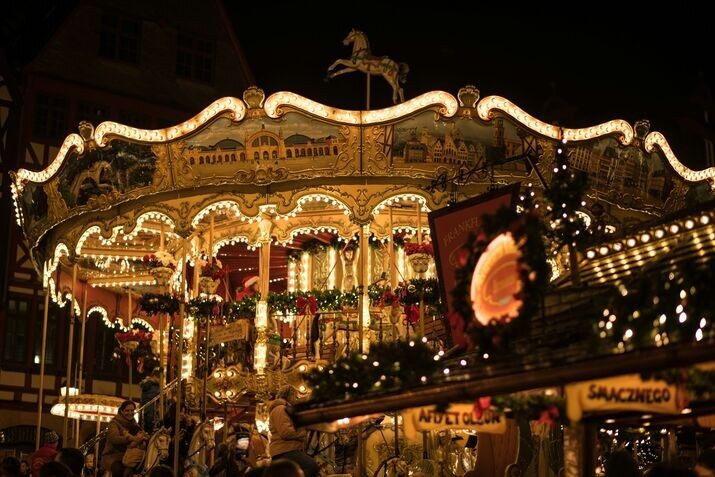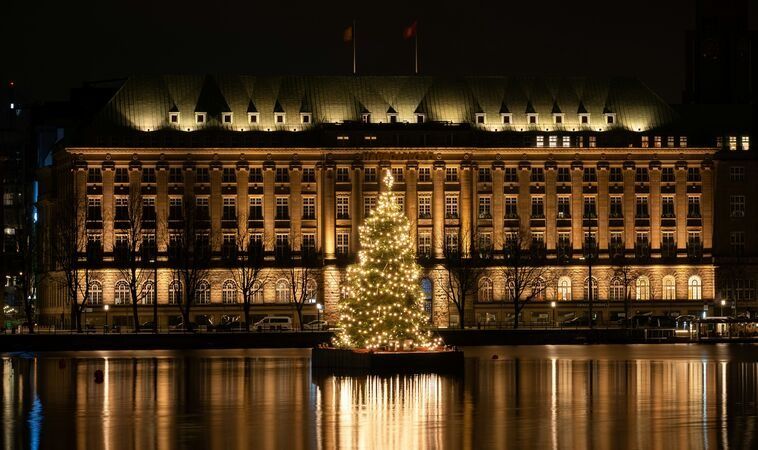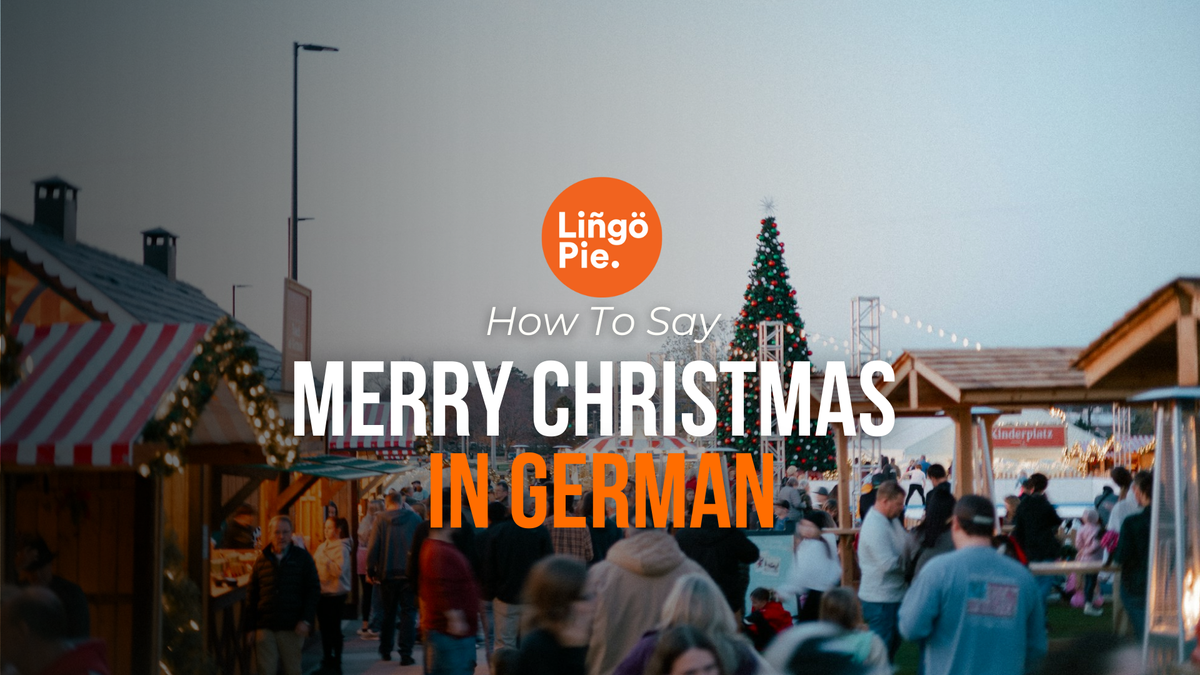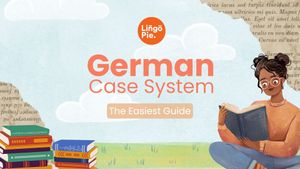I’ll never forget my first Christmas in Germany. It was cold, darker than I was used to, and I missed home. But then I walked into my first German Christmas market, and everything changed. The smell of roasted nuts and mulled wine filled the air, twinkling lights were everywhere, and cheerful music made the whole place feel alive. It was like something out of a storybook.
Now, after spending four Christmases here, I’ve come to really like German holiday traditions. There is a warmth and special feeling associated with every tradition, whether it is lighting candles on an Advent wreath or eating delicious Stollen. And, of course, I’ve learned how to say “Merry Christmas” in German—Frohe Weihnachten!
In this article, I’ll share how to say 'Merry Christmas' in German and explore some of the beautiful traditions I’ve experienced. If you’d like to bring a touch of German magic to your Christmas celebrations, you’re in the right place.
- How To Say Thank You In German? 18 Natural Ways
- How Long Does It Take To Learn German? [2026 Guide]
- 25 Pick Up Lines In German For Flirting In Style

How To Say "Merry Christmas" In German
If you're planning to spend Christmas in Germany or with German-speaking friends, learning how to say Merry Christmas is a great way to get into the festive spirit. The most common way to wish someone a Merry Christmas in German is by saying Frohe Weihnachten (pronounced “FROH-eh VY-nahk-ten”).
But that’s not the only way to spread some Christmas cheer in Germany. You can also say Fröhliche Weihnachten (pronounced “FROH-likh-eh VY-nahk-ten”), which means "Joyful Christmas." It’s a little more festive and lively, perfect for a cheerful greeting!
For a more casual or general holiday wish, you might hear Schöne Feiertage ("SHUR-neh FYE-er-tah-guh"), which translates to "Happy Holidays." This works well if you're not sure whether someone celebrates Christmas but still want to send good wishes.

7 Must-Know German Christmas Traditions
Celebrating Christmas in Germany has been such a fun experience. While I thought I knew all about Christmas, the traditions here are truly special and so different from what I’m used to. I’m excited to share some of the best German Christmas customs with you—these are the ones that make the holiday season feel extra festive.
1. Advent Calendars (Adventskalender)
Let’s start with the Advent calendar because it’s everywhere—and I mean everywhere. I used to think they were just for kids, but in Germany, everyone takes part. It could be a chocolate-filled calendar from the supermarket or an elaborate DIY version with tiny gifts. The excitement of opening one little surprise a day until Christmas is something you’ll love. It’s a sweet (literally!) way to count down to the big day.
2. St. Nicholas Day (Nikolaustag)
Here’s a fun one for December 6th: kids leave out their boots or shoes the night before, hoping St. Nicholas will fill them with treats. When I first heard about this, I thought, “Shoes? Really?” But waking up to see chocolate, nuts, and little gifts tucked into your boots is pretty adorable. Just make sure the shoes are clean—St. Nicholas apparently skips the dirty ones!
3. Christmas Markets (Weihnachtsmärkte)
If you’ve seen pictures of Germany at Christmas, chances are it was a Christmas market. These markets are like stepping into a fairytale, with rows of wooden stalls selling handcrafted ornaments, steaming mugs of mulled wine (Glühwein), and enough twinkling lights to make your heart burst. My favorite thing to do is grab a hot bratwurst and stroll around while sipping Glühwein.

4. The Christmas Pickle
This quirky tradition is quite fun! On Christmas Eve, some German families hide a small ornament in the shape of a pickle inside the Christmas tree. The first person to find it on Christmas morning gets a special gift or good luck for the coming year. It’s a fun way to add a little extra excitement to the holiday, and now I can't imagine Christmas without this little treasure hunt!
5. The Christmas Tree (Weihnachtsbaum)
What if I told you that the tradition of decorating Christmas trees started in Germany? They take it pretty seriously here. Families usually wait until Christmas Eve to decorate the tree, and some even use real candles (don’t worry, safety measures are a big deal). The decorations are often timeless and elegant—think glass baubles, wooden ornaments, and a shining star on top.
6. Christmas Eve (Heiligabend)
Speaking of Christmas Eve, this is when the magic really happens. It’s the main event in Germany—families come together for a cozy evening of food, church services, and gift-giving, or Bescherung as they call it.
7. New Year’s Eve (Silvester)
Okay, technically, this isn’t Christmas, but it’s too fun to leave out. Germans love celebrating Silvester, and it’s like an extension of the holiday season. One quirky tradition is pouring molten lead into water to "predict" the future—it’s like festive fortune-telling! And don’t be surprised if you end up eating a jelly-filled donut (called a Berliner) or toasting with sparkling wine at midnight.

Christmas Vocabulary In German
If you're spending Christmas in Germany or just want to get into the holiday spirit, learning a few Christmas words in German is a fun way to start. Let’s go through some of the most common Christmas words you’ll hear around the holidays!
FAQs About Christmas In Germany
Wondering what makes Christmas in Germany so special? Let’s answer some of the most common questions to give you a deeper look at German Christmas celebrations.
1. When Do Germans Start Celebrating Christmas?
In Germany, the Christmas season officially starts with the beginning of Advent on the fourth Sunday before Christmas. Advent calendars and wreaths are commonly used to count down the days leading up to Christmas Eve.
2. Do Germans Celebrate Christmas On December 25th?
Christmas is mainly celebrated on December 24th, Christmas Eve (Heiligabend). Families typically exchange gifts, enjoy a festive meal, and attend church services. December 25th (Weihnachtstag) is a more relaxed day, often spent with family or friends.
3. Do Germans Have Santa Claus?
Yes, Germans have a version of Santa Claus called der Weihnachtsmann. However, in many parts of Germany, children also celebrate St. Nicholas on December 6th, which brings small gifts and treats.
Enjoy The Holidays Learning German With Lingopie
Christmas in Germany is full of special traditions, like opening an Adventskalender or wishing others Frohe Weihnachten. These traditions make the holiday feel magical and bring it to life. By learning a few German words and understanding these traditions, you can experience the season in a whole different light.
If you want to learn more about the German language and culture, Lingopie is a great way to start. It makes learning fun by letting you watch German TV shows and movies so you can pick up phrases and get a better feel for the language. Give it a try today and start exploring German Christmas traditions and much more. Tschüss!








![7 Best Apps To Learn German On Your Own [REVIEWED]](/blog/content/images/size/w300/2026/01/best-apps-to-learn-german-on-your-own.png)
![6 Best German Translator Apps For Beginners [TESTED]](/blog/content/images/size/w300/2026/01/Best-german-translation-apps-for-beginners-.jpeg)
